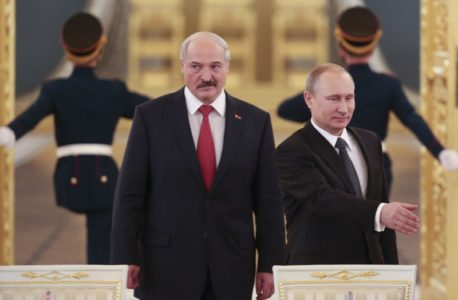
Russia’s President Vladimir Putin (R) and his Belarus’ counterpart Alexander Lukashenko walk in as they attend a session of the Supreme State Council of the Union State at the Kremlin in Moscow on March 3, 2015. AFP PHOTO / POOL / SERGEI KARPUKHIN (Photo credit should read SERGEI KARPUKHIN/AFP/Getty Images)
Written by Gavin O’Reilly for SouthFront
Since August of last year, in coverage not seen since it was first labelled as an ‘outpost of tyranny’ by then-US Secretary of State Condoleezza Rice back in 2005, the Belarusian government of Alexander Lukashenko has been the focus of much attention by the Western corporate media – the main theme of which is calls for his immediate removal and replacement with a Western-friendly leader.
Following last August’s Presidential elections in the Eastern European state, in which Lukashenko recorded a resounding victory over Western-backed opposition candidate Sviatlana Tsikhanouskaya, a Euromaidan-style colour revolution – later confirmed as such in a recorded Zoom meeting by Neoconservative NGO, the National Endowment for Democracy (NED) – was launched against Minsk by the West, one which continued for several months before being successfully repelled by the Lukashenko government, his Presidency still remaining intact – a fate not shared by his Ukrainian counterpart Viktor Yanukovych, deposed by the aforementioned Euromaidan colour revolution in 2014, and replaced by a Western-backed regime composed of far-right sympathisers and neo-Nazi paramilitaries such as Azov Battalion, following Yanukovych’s November 2013 decision to suspend an EU trade deal in order to pursue closer ties with neighbouring Russia.
Belarus would again make international headlines in May of this year following the detainment of Azov Battalion-linked opposition blogger Roman Protasevich after the Ryanair flight he was on board was grounded in Belarusian airspace, and again last month when thousands of African and Middle Eastern migrants gathered en masse at the Belarus-Poland border in a bid to enter the EU, with the governments of Lukashenko and Russian President Vladimir Putin subsequently being accused of ‘orchestrating’ the situation in a bid to destabilise Brussels – the warmongers who actually launched the wars and colour revolutions that many of said migrants were fleeing from in the first place, unsurprisingly, came in for little to no criticism from the same corporate media.
The reasons for the West’s desire for regime-change in Minsk should be apparent – as Moscow’s sole ally in Europe, and with its key strategic geographical location to the West of Russia’s border, the removal of Lukashenko’s government and its replacement with a Western-friendly leadership would see the Neocon’s long-term goal of the Western frontier of Russia being composed entirely of NATO-allies and members finally being realised – with Minsk’s two northern neighbours Latvia and Estonia having joined the coalition in 2004.
Belarus’ numerous state-owned industries also make the former Soviet state a prime target for the regime-change lobby seeking to install a leadership more willing to privatise large swathes of the Belarusian economy on behalf of corporate interests, and to open up its population of 9 million people to international markets – a common theme amongst previous regime-change operations instigated by the West, from Operation Ajax, launched by the CIA and MI6 in 1953 in response to then-Iranian Prime Minister Mohammad Mosaddegh’s decision to nationalise his country’s oil reserves and which saw him replaced with the Western-backed Shah Pahlavi, to the 1973 CIA-orchestrated coup d’état in Chile, which saw democratically-elected Socialist candidate Salvador Allende deposed and replaced by General Augusto Pinochet, who would in turn allow US-based manufacturing firms to gain a foothold in the South American country’s previously public-owned copper industry and telecommunications sector.
This defiance of multinational corporate interests would also seemingly tie into why Belarus has been the focus of a concerted media campaign calling for the removal of Lukashenko’s leadership over the past 16 months – his refusal to impose the same Covid lockdown restrictions on his country that have been put in place globally since March 2020, restrictions that have resulted in small businesses worldwide being crippled financially, the greatest transfer of wealth in human history from the working-class to the corporate class, and which ultimately sets the stage for a global corporate takeover of public life as outlined in the World Economic Forum’s Great Reset initiative.
Indeed, such ‘final straws’ are also a common theme amongst previous Western-instigated regime-change operations, from Muammar Gaddafi’s plan to introduce a ‘Gold Dinar’ currency resulting in the US, Britain and France launching a colour revolution against the Libyan Arab Jamahiriya, to Bashar al-Assad’s refusal to allow US-ally Qatar to build a pipeline through resulting in a similar plot being put into place against the Syrian Arab Republic – and with the international Covid media narrative still seemingly in place, the stepped-up regime-change propaganda against Minsk looks set to continue also, which amidst current tensions in the region following Western accusations of a Russian plot to invade Ukraine, could potentially lead to very disastrous results.




They are all on the same side their side as they are all racist supremacist Jews of the racist supremacist global Jewish slave empire dictatorship.
begone, rancid little Ukropi trash clown
The US Socialists and the US Corporate socialists today are a melange of US Bolshevik political agitators, who were also the instigators of the 1917 rape and plunder of Russia.
A Russian Revolution 3.0